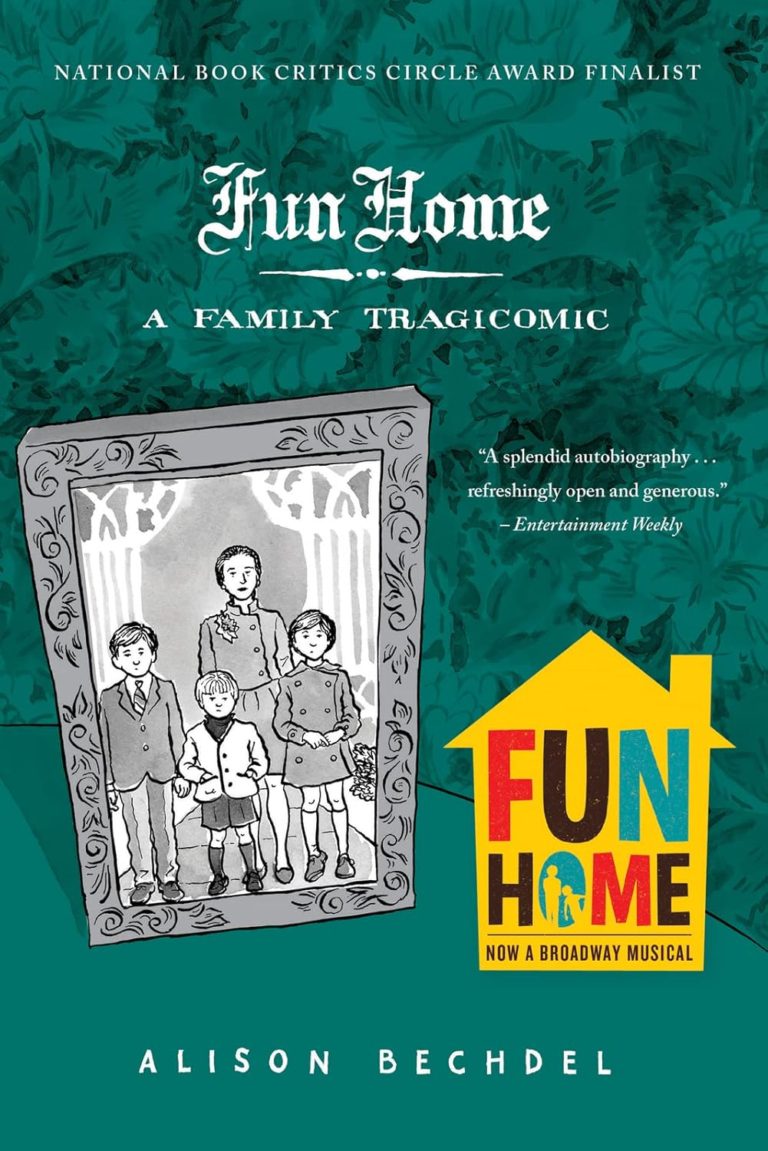In the graphic memoir Fun Home, Alison Bechdel skillfully intertwines themes of identity, family, and the complexities of coming out. This work provides a comprehensive examination of the narrative, looking into its rich plot, character developments, and intricate symbolism.
The analysis focuses on key characters and their growth while also reflecting on the book’s broader cultural significance and critical reception. This exploration invites an understanding of how Fun Home resonates with contemporary readers, highlighting its enduring impact and relevance.
Overview of Fun Home by Alison Bechdel
“Fun Home,” a poignant graphic memoir by Alison Bechdel, intricately weaves themes of coming-of-age, identity, and familial relationships into a compelling narrative that balances humor with melancholy.
Through its artistic expression, the memoir delves into the complexities of the father-daughter relationship within the context of LGBTQ+ issues, illuminating layered family dynamics and the emotional journey of self-discovery.
This graphic novel functions not only as a personal narrative but also as a cultural commentary on broader societal norms regarding sexuality and acceptance.
Summary of Plot and Themes
The plot of Fun Home centers on Alison Bechdel’s intricate relationship with her father, a funeral home director, looking into themes of identity, loss, and the pursuit of self-acceptance.
In this poignant memoir, the contrast between her father’s dual existence—as a meticulous caretaker of the dead and a deeply troubled individual—unveils layers of familial secrets that permeate the narrative.
As the story progresses, Alison grapples with the trauma of her childhood, capturing not only the weight of grief but also the challenge of understanding her father’s repressed sexuality and its influence on her own identity.
Through vivid visual storytelling, readers experience flashbacks that illuminate this complex dynamic, highlighting how death shapes the contours of life and the profound emotional resonance that lingers long after the final goodbye.
Analysis of Characters
The characters in Fun Home are essential components in Alison Bechdel’s examination of complex themes, including identity and familial relationships.
Notably, the intricate father-daughter relationship serves as the narrative’s foundation.
Key Characters and Their Development
Alison Bechdel and her father, Bruce Bechdel, serve as central figures in Fun Home, each embodying distinct aspects of identity, trauma, and the quest for authenticity.
Their complex relationship functions as a lens for readers to investigate themes of honesty and betrayal, particularly as both individuals confront their personal struggles.
For Alison, the path to self-acceptance is marked by the emotional challenges of growing up in a family laden with secrets and societal expectations. Conversely, Bruce contends with the burdens of his unfulfilled desires and concealed identity, ultimately leading to a tragic conflict.
As the narrative progresses, their interactions expose the profound emotional scars shaped by their experiences, driving them toward unexpected transformations that significantly influence their lives.
The memoir compellingly illustrates how the bonds between them serve as both a source of strength and profound anguish, capturing the intricate dynamics of love and loss.
Interpretation of the Book
The interpretation of Fun Home presents a complex tapestry of themes and symbolism, engaging readers in a deep exploration of identity, sexuality, and the intricacies of familial relationships.
Themes and Symbolism
Themes of trauma, identity, and self-discovery are intricately woven throughout Fun Home, with symbolism playing a crucial role in enhancing the narrative’s depth and emotional impact.
Through the lens of personal experiences, the memoir delves into how these themes intersect with broader societal issues, particularly the struggle for acceptance within a complex cultural landscape. The artistic influence is evident, as the author employs unique storytelling techniques that intertwine visual elements with poignant text, creating a rich tapestry that resonates on multiple levels.
This interplay enables readers to engage with the emotional weight of moments that reflect not only individual struggles but also collective cultural narratives. By utilizing symbols such as the Bechdel family home, the memoir invites readers to contemplate the nuances of familial relationships and the often conflicting notions of love, loss, and identity.
Impact of Fun Home
The impact of Fun Home extends beyond its pages, receiving critical acclaim and establishing itself as a significant work in queer literature.
It is recognized for both its literary merit and cultural significance.
Critical Reception and Cultural Significance
Fun Home has received widespread critical acclaim, not only for its artistic narrative but also for its profound cultural significance within the realm of queer literature.
The memoir has garnered numerous awards, including the Eisner Award for Best U.S. Graphic Album, highlighting its innovative approach to storytelling through the graphic novel format. Critics and readers have praised its intricate exploration of identity, particularly in how it reflects broader societal discussions surrounding LGBTQ+ representation and familial relationships.
Many reviews emphasize the book’s ability to resonate with individuals navigating their own journeys of self-discovery, establishing it as a cornerstone of contemporary literature.
By engaging with themes of gender, sexuality, and personal history, this memoir has facilitated vital conversations about acceptance and the complexities of the human experience.
Personal Reflection on Fun Home
Personal reflections on “Fun Home” frequently demonstrate a profound emotional impact, as readers engage with Alison Bechdel’s journey of self-discovery and the complexities of family dynamics.
Thoughts and Opinions on the Book
Readers’ thoughts and opinions on Fun Home frequently emphasize the memoir’s emotional journey, highlighting the raw honesty and vulnerability present in Bechdel’s storytelling.
The narrative encourages readers to explore intricate themes such as identity, sexuality, and mortality, creating a profound resonance that inspires reflection on their own lives.
Through her nuanced character development, Bechdel crafts a deeply relatable experience, enabling audiences to connect with the complexities of familial relationships and the pursuit of self-acceptance.
As they engage with the rich tapestry of her experiences, readers are not only captivated but also compelled to confront their own emotional landscapes.
This memoir functions as a mirror, prompting individuals to examine how their personal histories influence their identities and illustrating the coexistence of love and loss.


